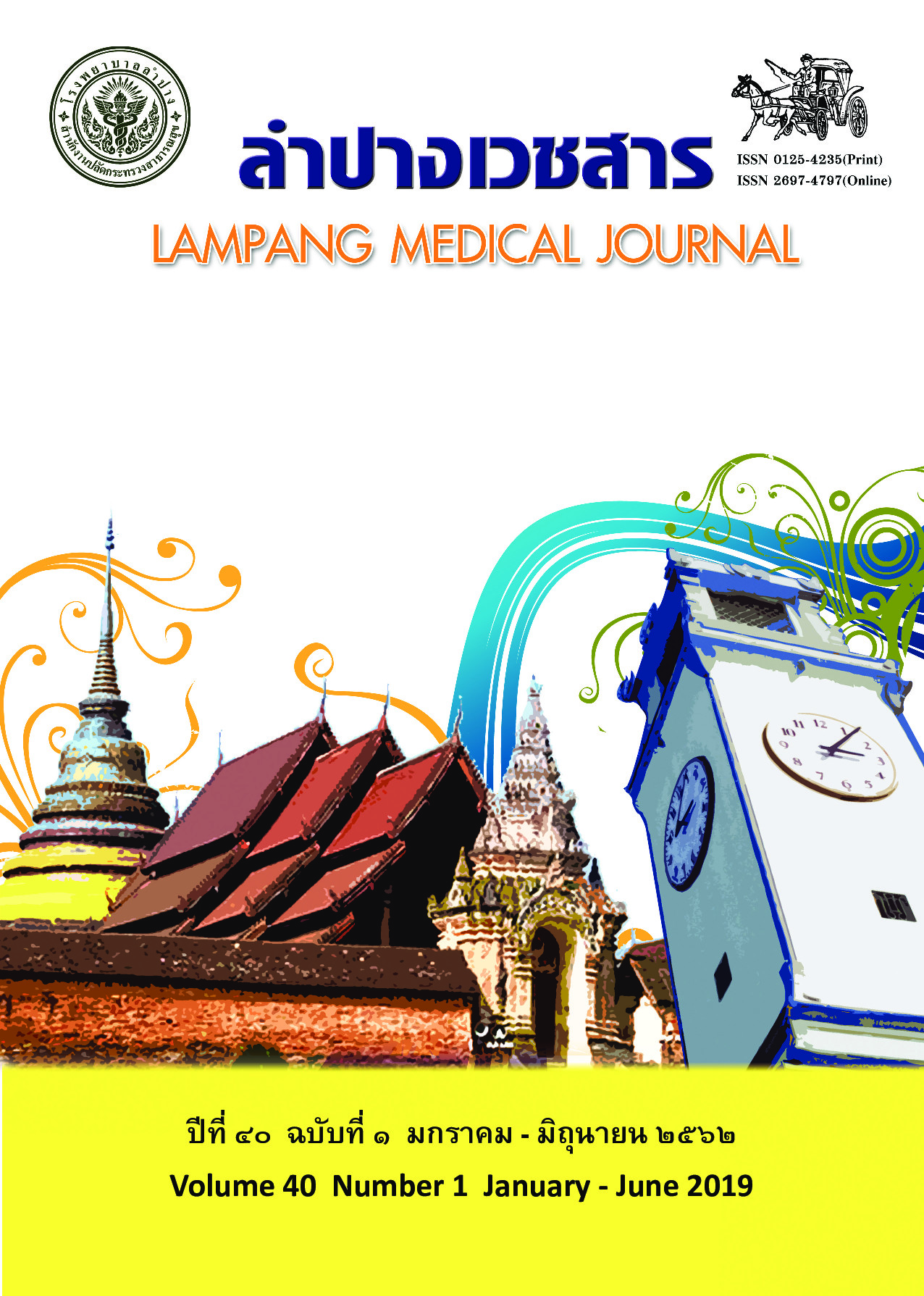Effects of Low Sodium Dietary Education in Hypertensive Patients with Stage 3 Chronic Kidney Disease in Mae Sai District, Chiang Rai, Thailand
Main Article Content
Abstract
Background: Chronic kidney disease (CKD) in patients with hypertension (HT) has increased in recent years in the Mae Sai district, Chiang Rai, Thailand. Patient education about a low sodium diet may help delay disease progression.
Objective: To determine the effects of a low sodium dietary education in hypertensive patients with CKD stage 3, compared between those who attended an education class for a low sodium diet and those who received the regular heath education program.
Material and method: A quasi-experimental, pretest-posttest, two group design study was conducted among 68 patients with HT who had CKD stage 3 and were treated at Srimueangchum Tambon Health Promoting Hospital. The study group (n=34) attended an education class for a low sodium diet and received a home visit program for 6 months (February - July 2017). The control group (n=34) received the regular heath education program. The blood pressure, serum creatinine and estimated glomerular filtration rate (eGFR) were measured before, and after finishing the program. The data was analyzed by using the t-test and the exact probability test.
Results: After finishing the health educational programs, the average systolic blood pressures increased 1.7 mmHg in the study group but decreased 4.5 mmHg in the control group (p=0.198). The average diastolic blood pressures were slightly decreased in both groups (0.4 vs 2.2 mmHg, p=0.531). The declined serum creatinine levels were not significantly different between the two groups (-0.2 vs -0.1 mg/dl, p= 0.516). Increment of eGFR was slightly higher in the study group than in control group (17.8 vs 13.0 ml/min/1.73 sq.m., p=0.821).
Conclusion: The effects of low sodium dietary education in hypertensive patients with CKD stage 3 tended to decrease the serum creatinine levels and increase the eGFR. This program might be an optional method to delay disease progression.
Article Details
บทความที่ส่งมาลงพิมพ์ต้องไม่เคยพิมพ์หรือกำลังได้รับการพิจารณาตีพิมพ์ในวารสารอื่น เนื้อหาในบทความต้องเป็นผลงานของผู้นิพนธ์เอง ไม่ได้ลอกเลียนหรือตัดทอนจากบทความอื่น โดยไม่ได้รับอนุญาตหรือไม่ได้อ้างอิงอย่างเหมาะสม การแก้ไขหรือให้ข้อมูลเพิ่มเติมแก่กองบรรณาธิการ จะต้องเสร็จสิ้นเป็นที่เรียบร้อยก่อนจะได้รับพิจารณาตีพิมพ์ และบทความที่ตีพิมพ์แล้วเป็นสมบัติ ของลำปางเวชสาร
References
2. World Health Organization. Guideline: sodium intake for adults and children. Geneva, World Health Organization, 2012.
3. วณิชา พึ่งชมภู, สถานการณ์การดูแลระยะสุดท้ายในผู้สูงอายุไทยโรคไตวายเรื้อรัง. พยาบาลสาร 2557;41(4):166-77.
4. สำนักโรคไม่ติดต่อ กรมควบคุมโรค กระทรวงสาธารณสุข. รายงานผลการทบทวนรูปแบบการดำเนินงานป้องกันการเกิดโรคไม่ติดต่อในวิถีชีวิตด้วยการลดการบริโภคเกลือ. กรุงเทพฯ:องค์การสงเคราะห์
ทหารผ่านศึก; 2556.
5. รสสุคนธ์ วาริทสกุล. การจัดการอาหารเพื่อชะลอความเสี่ยงของไตในผู้ป่วยโรคไตวายเรื้อรังจากเบาหวาน. วารสารพยาบาลทหารบก 2557;15(1):22-8.
6. ศิริอร สินธุ, พิเชต วงรอด, บรรณาธิการ. การจัดการรายกรณีผู้ป่วยโรคเบาหวานและความดันโลหิต. กรุงเทพฯ:วัฒนาการพิมพ์; 2556.
7. สินีนุช เสนีวงศ์ ณ อยุธยา. ปัจจัยที่มีอิทธิพลความร่วมมือในการรับประทานอาหารโซเดียมใน
ผู้ป่วยหัวใจวาย. [วิทยานิพนธ์พยาบาลศาสตรดุษฎีบัณฑิต สาขาพยาบาลศาสตร์(นานาชาติ)].
กรุงเทพฯ:จุฬาลงกรณ์มหาวิทยาลัย; 2557.
8. ปิ่นแก้ว กล้ายประยงค์, กรัณฑรัตน์ บุญช่วยธนาสิทธิ์. ประสิทธิผลของโปรแกรมสุขศึกษาในการสร้าง
เสริมพฤติกรรมการปฏิบัติตัวเพื่อชะลอความเสื่อมของไตสู่ภาวะไตเรื้อรังระยะสุดท้ายของผู้ป่วย
ไตเรื้อรังระยะที่ 3 และ 4 ที่แผนกผู้ป่วยนอกอายุรกรรมโรคไต.วารสารวิทยาลัยพยาบาลพระปกเกล้า
จันทบุรี 2551;19(2):49-60.


